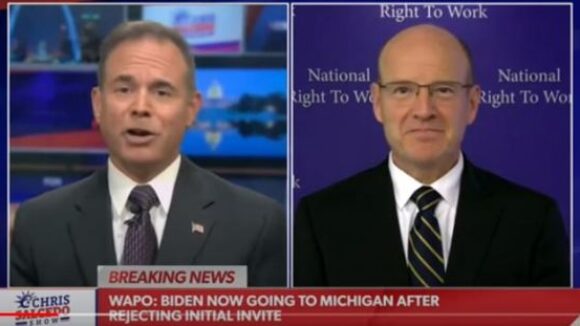Mark Mix discusses the Fallout from the UAW Strike and Big Labor $$$ on St. Louis’s Newstalk
Mark Mix Discusses the Fallout from the UAW Strike on St. Louis’s Newstalk with Mike Ferguson.
With the power to negotiate international trade agreements about to expire, Democrats in Congress are pressing the White House to accept provisions that would boost the power of Big Labor in the United States in exchange for extending negotiating authority. In fact, many argue they are promoting the ability of foreign countries to question the legality of existing Right to Work laws.
Washington Post reporter Peter Goodman has the story:
The Bush administration needs congressional blessings for recent trade deals with Peru, Colombia and Panama, as well as another pact still being hammered out with South Korea. The administration is also seeking the extension of the president’s fast-track authority — the right to negotiate trade deals, then submit them to Congress for a simple up-or-down vote without amendments. That power expires at the end of June.
But rather than allow the Executive Branch the ability to promote the sale of American products abroad (products that in many cases are made with union jobs), Democrats in Congress are carrying water for the bosses — promoting provisions that could be used to question existing Right to Work laws.
House leaders have demanded that new deals include the core principles of the International Labor Organization, a U.N. body in Switzerland that seeks to improve the lot of workers. . . . Some Republicans and business groups have argued that unions could use the standards as a way to increase their power in the United States, wielding the force of international treaty to mandate changes in American law.
Several American states allow managers to replace striking workers, while right-to-work states bar the exclusion of workers who are not members of unions, both potential conflicts with the ILO principles, scholars say. . . . Republicans who are worried about the ILO issue note that any treaty language ratified by Congress becomes binding American law. They fear other countries would bring trade complaints against the United States asserting that the nation, in its treatment of workers, is not living up to the terms of its trade deals.
Were ILO principles to be inserted into trade agreements, “there’s a possibility that our own laws could get questioned,” said Rep. Paul Ryan (R-Wis.), during a House Ways and Means Committee hearing in January.
We have seen the AFL-CIO go to the United Nations and other international bodies to request assistance in undermining American law. Enactment of these provisions in trade legislation could give these international organizations the power to change American law.
So much for American sovereignty.

Mark Mix Discusses the Fallout from the UAW Strike on St. Louis’s Newstalk with Mike Ferguson.

Union boss Shawn Fain claims to oppose “corporate welfare,” but isn’t hesitant to personally benefit from it. (Credit: Status Coup News…

National Right To Work President Mark Mix appeared on Newmax’s Chris Salcedo Show to discuss the ongoing UAW Strike and It’s Potential Impact on the Economy.